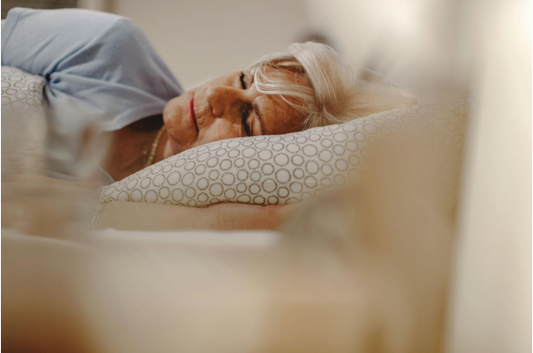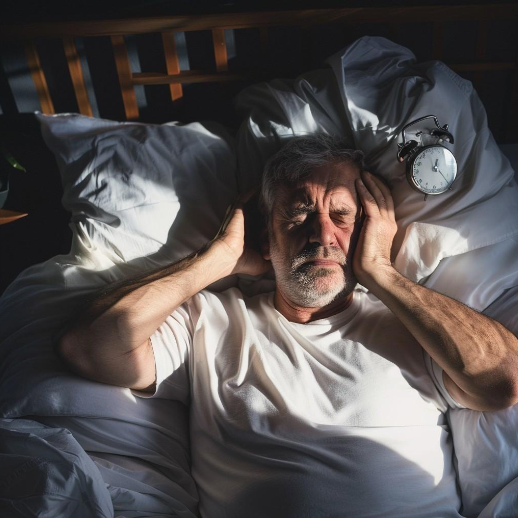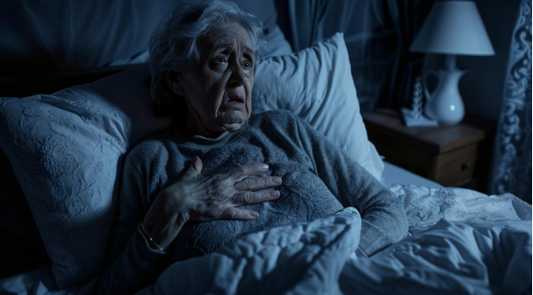Some may wonder is it harder to sleep when you get older, the answer is yes. As we age, our sleep patterns often change. We may find it harder to fall asleep or stay asleep through the night. We may also wake up more often during the night. These changes are normal and are often due to changes in our sleep cycles. However, sleep problems can also be caused by other factors, such as medical conditions, medications, and changes in our environment. Sleep problems can lead to a number of other issues, such as fatigue, moodiness, and difficulty concentrating. They can also make it harder to recover from illness or injury. If you’re having trouble sleeping at night, there are a number of things you can do to address the problem. In this blog post, we’ll discuss some of the most common sleep problems in older adults and offer tips for how to sleep better as you age.
How much sleep does an adult need?
There are a number of myths about sleep problems that need to be debunked. One common myth is that older people do not need as much sleep as younger people. In fact, research has shown that elderly people need just as much sleep as younger people. The average adult needs 7-8 hours of sleep per night, even as they grow into old age.
The Different Types Of Sleep Problems Older People Face
As we get older, our bodies naturally start to experience a decline in health. This includes a decrease in the number of hours that we are able to sleep each night. As a result, older people are more likely than younger people to experience one or more of the four different types of sleep problems.
- Sleep apnea is when someone stops breathing during their sleep.
- Restless leg syndrome is when individuals have trouble sleeping because their legs keep moving uncontrollably.
- Insomnia is when an individual can't fall asleep, or falls asleep but then wakes up frequently throughout the night.
- Obstructive sleep apnea is when enlarged soft tissues (plugs) block off airflow through your nose and cause you to stop breathing during sleep.
Sleep products that can help elderly people with their sleep issues include devices that monitor your breathing and provide feedback on how well you're sleeping, as well as medications for obstructive sleep apnea. Additionally, it's important to remember that not all older people will require medication for their specific sleep problems; some may only need natural sleep aids, patience, and lifestyle adjustments to improve their quality of sleep.
Tips for Better Sleep as You Get Older
- Exercise More - One of the most important things you can do to improve your sleep is to exercise more. It has been scientifically proven that exercise increases the levels of brain-derived neurotrophic factor (BDNF), which is a compound with neuroprotective properties as well as regenerative and anti-inflammatory effects. Research on BDNF also shows that it decreases feelings of fatigue and improves cognitive function, emotional health, and performance. In addition, muscle contraction activity in the body releases BDNF into the bloodstream, which helps increase the production of melatonin in the body naturally at night. So, if you want to sleep better as you age, start doing some exercise while you are still young!
- Avoid Long Naps - Another way to sleep better as you age is to avoid long naps. A short 10 or 15 minute power nap is fine but when you go longer than that, naps can cause sleep deficits and make it difficult to sleep at night. To avoid this, simply cut back on the number of naps that you take and make sure that you only take them in the morning when it is time for your nighttime routine. A good tip for older adults who need to get up during the night is to set an alarm for 1 hour before your usual time for wake-up. This will help you wake up at a consistent time without having to worry about snoozing or oversleeping.
- Decrease Alcohol Consumption - Alcohol is one of the most common causes of sleep problems. Studies have shown that alcohol can disrupt sleep quality and reduce total sleep time by as much as 2 hours for some people. In addition, heavy drinking that occurs before bedtime may result in a lower number of REM cycles which are crucial for deep sleep.
- Reduce Your Caffeine Intake - Another thing that might negatively affect your sleep is caffeine. For some people, caffeine might cause them to feel more alert and awake during the day. This can then interfere with their ability to produce melatonin at night. If you want to avoid these problems, it's best to abstain from caffeinated drinks such as coffee and tea before bedtime.
- Take Natural Medicine for Sleep Problems - Taking natural supplements for better sleep is a great starting point. The best natural sleep aids for seniors can help you relax easier, fall asleep faster, and stay asleep longer. Check out our Top 5 Sleep Aids For The Elderly post for more details.
Why Sleep Issues Become More Common As We Age
As we get older, our sleep habits tend to change. This is due to a number of factors, including that as we age our bodies naturally become less able to regulate their own sleep-wake cycles. Some sleep problems can be attributed to things like hormonal changes and reduced levels of melatonin. It’s also important to note that as we age, our circadian rhythms shift before and after sleep. In the morning, your body naturally wakes up earlier than it did when you were younger. During the day, your body knows when it’s time for bed, so sleeping is easier in the evening. As we get older, it becomes more difficult to fall asleep at the same time each night which can lead to poorer quality slumber. As a result, elderly people are more likely than younger people to have sleep issues.
Sleep issues for older people can include difficulty falling asleep, staying asleep, and waking up in the middle of the night. Additionally, elderly people are more likely than younger people to experience pain during or after sleeping. Sleep problems can lead to decreased productivity and overall well-being in elderly individuals. In addition, the elderly are also more prone to accidents and injuries, and physical pain can make it difficult for them to get a good night's sleep.
4 Main Causes of Sleep Problems in Older People
- Medical - Illnesses, health problems, and medication can cause sleep problems. Sleep disorders may be caused by a number of illnesses, including cancer, Parkinson’s disease, and anxiety. Some medications that may contribute to sleep problems include melatonin for jet lag, hormone therapy for pre-menopause and post menopause, and antidepressants. Many people also struggle with sleep because of the demands of work or family life. It is important to make sure you are getting enough rest so you are mentally sharp throughout the day. Any time you are using your mind intensely, it is essential that you give it ample time to rest! If you feel exhausted or have trouble sleeping through the night, talk to your doctor about how they might be able to help you better manage your symptoms
- Stress - Stress can greatly contribute to sleep problems. It can be a difficult endeavor to find the balance between being productive and keeping up with your responsibilities and still having time to relax. If you are experiencing stress and still finding it hard to sleep well, there are things that you can do in order to relax more to help with falling asleep.
- Major Life Changes - When you retire, you may experience a lot of loss and be unable to sleep well. For some people, this might even cause depression. This is because they used to rely on the routine that they followed during work hours and now have no more structure in their lives. If you think that your life is not as organized as it used to be or if you feel like your life has changed so much since retirement, then it’s important for you to take the time to find a way to sleep better.
- Menopause - One main consequence of a woman’s menopause is that there is an increase in the production of estrogen. This can make it difficult for women to sleep. Although some women experience less sleep after menopause, others have more difficulty sleeping as well. This may be because estrogen disrupts the body’s natural sleep cycle, leading to poor-quality sleep. Another cause of sleep problems during menopause is the natural increase in body temperature that occurs at night with age.
Conclusion
Sleep is an important part of our overall health and well-being; it's essential for sustaining our energy levels, keeping our moods stable, and preventing diseases. In addition, good sleep habits can help to improve cognitive function and memory recall. Sleep problems are common in the elderly, and can lead to a number of issues such as fatigue, moodiness, and difficulty concentrating. It is important for elders to get enough quality sleep so they can stay healthy and functional.
FAQs
Should you see a doctor about your sleep problems?
If you have health concerns, sleep is essential to maintaining your physical, mental, and emotional health. Here are five signs you may have a sleep disorder. If you don’t get enough sleep, you’re more likely to feel tired, moody, and irritable. You might also be more likely to experience heart problems, headaches, or weight gain. If you aren’t getting enough sleep, it’s important to get treatment so that you can get the rest you need. If you aren’t sleeping well, it can be hard to function at your best during the day. It’s always best to speak with your doctor about how much sleep you need each night. You may also want to check our list of natural sleep aids that could help you get a better night's sleep.
P.S.





